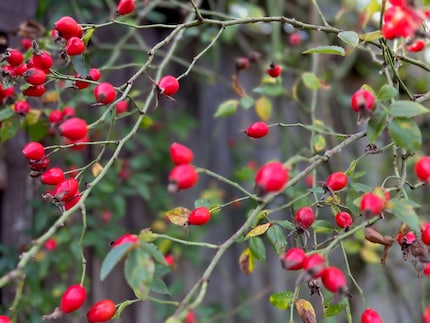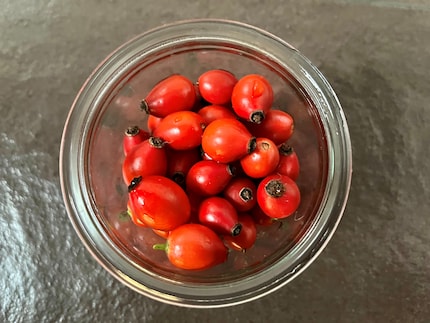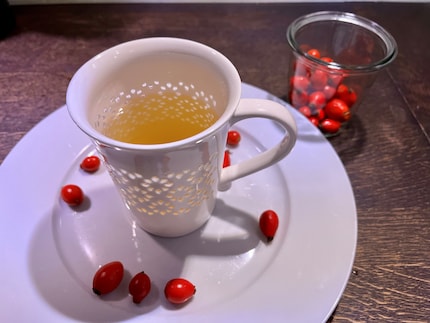
Guide
Superfoods by the wayside: you can find these three wild herbs now
by Darina Schweizer

Anti-ageing, immune system boost, good for the heart - rosehips are not just beautiful to look at, they're a real secret weapon for your health. What's more, they're delicious as a liqueur or chutney, for example.
My garden is a wild mix of native plants that are allowed to spread as they please and, incidentally, provide an ecological paradise for many wild animals. But the animals aren't the only ones to enjoy the fruit, I too collect treasures from this little corner of wild nature every season. In autumn, the fruits of one plant in particular stand out: the rosehips of the wild rose.
Below their bright red hides a real health booster for your immune system, which you can easily turn into tasty dishes.

Roots owe their red colour to a secondary plant substance, lycopene, which also gives tomatoes their red colour. Lycopene has an antioxidant effect, so it protects the body against free radicals. This effect benefits your body in many ways and, incidentally, is a natural anti-ageing agent.
The recent research also shows that lycopene can do even more: thanks to its blood pressure-lowering effect, it prevents cardiovascular disease. It also has an anti-cancer effect, meaning it can prevent or delay the onset of cancer.

But rosehips have even more to offer. They also contain a large number of vitamins. Their vitamin C content, for example, is higher than that of citrus fruits, which are well known for this. They also provide vitamins A, B1 and B2. Fruit is rich in important minerals such as zinc, iron and sodium. Thanks to this abundance of healthy substances, rosehips have a positive effect on many bodily functions: they boost the immune system and are good for the skin and supporting tissues. Thanks to their anti-inflammatory properties, they are also thought to have a beneficial effect on rheumatism and arthritis. And rosehips are also good for the eyes: vitamin A preserves night vision, lycopene delays the onset of cataracts.
From a health perspective, then, there are many arguments in favour of red fruit. So pounce on rosehips! It's in raw fruit that you'll find the most healthy nutrients, as some vitamins and antioxidants are partially destroyed when they're heated. However, even after cooking, they retain healthy ingredients, such as lycopene, which resists heat.
The preparation options are as varied as the healthy substances contained in rosehips. If you want to get the full health boost, you can remove the hairs and seeds from the raw fruit and chop them finely to garnish your dishes.
But the absolute classic when it comes to rosehip is certainly rosehip infusion. You can quickly prepare it yourself: chop the rosehips, pour them into a colander and add hot water (do not use boiling water for a gentle infusion) on top. After about seven or eight minutes, the herbal tea is ready. Unlike bought sachets, homemade rosehip infusion is only very slightly orange.

Red berries are also easy to turn into jam, jelly or chutney. To do this, you can either cut the fruit one by one and seed it, so that the little hairs and seeds don't get in the way later. Alternatively, you can make it easier for yourself by boiling the rosehips whole and later squeezing the cooked mass through muslin to get rid of the troublesome bits.
For the confiture, you'll need: rosehips (1kg), water, a little cinnamon, jelling sugar (500g) and a squeeze of lemon. Cook the rosehips in a pan covered with water until soft. Then press the mass through a sieve and bring to the boil with the jelling sugar, seasoning with a little cinnamon and lemon juice. Pour the still-warm mixture into jars.
For the chutney, you'll need: rosehips (1 kg), sugar (350 g), vinegar (125 ml), (raisins (100 g), onions (150 g), spices (e.g. cinnamon, coriander, cloves, ginger, mustard). Bring all the ingredients except the spices to the boil, adding them only when the mixture has been reduced over a low heat for about an hour and a half. Then pour the still hot preparation directly into jars.
The rosehip liquor is a little more special, but almost easier to prepare. For this, you need: rose hips (1 kg), cane sugar (300 g), cinnamon, cloves, a lemon, an orange, brandy (1.5 litres). Mix the rosehips with the sugar and leave to macerate overnight in a large clear container. The next day, add the cloves, cinnamon, lemon and orange zest and brandy. Now you need to be patient: leave the mixture to rest for eight to ten weeks. Then pour it through muslin to remove the solids and bottle the liquid. After a further four weeks' rest, you can enjoy your homemade rosehip liqueur.
Headline photo: Anne Sandner
Science editor and biologist. I love animals and am fascinated by plants, their abilities and everything you can do with them. That's why my favourite place is always the outdoors - somewhere in nature, preferably in my wild garden.
Practical solutions for everyday problems with technology, household hacks and much more.
Show all